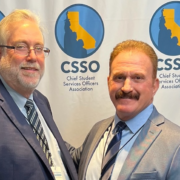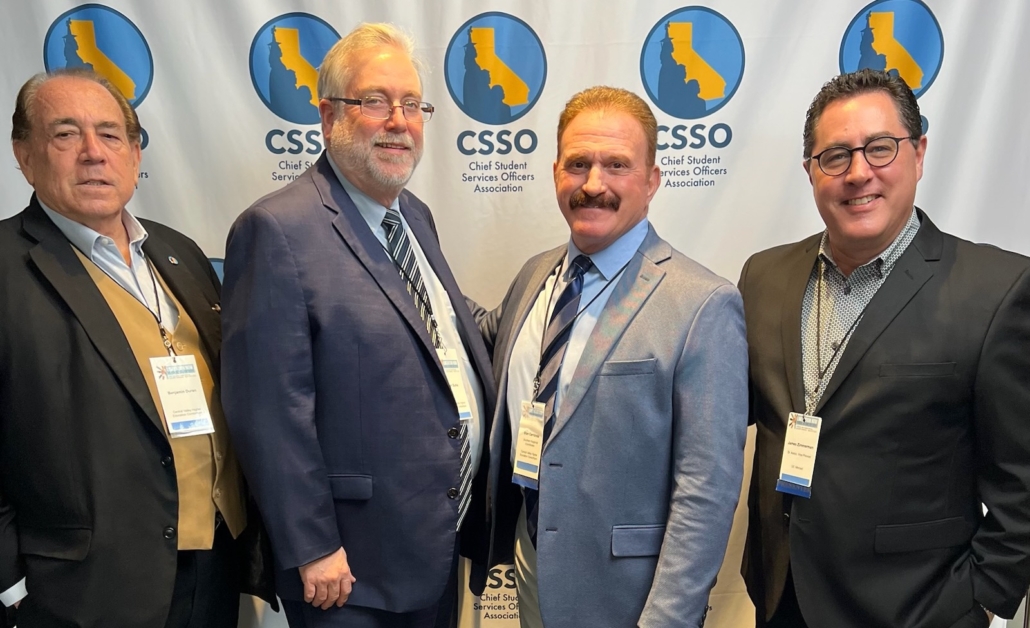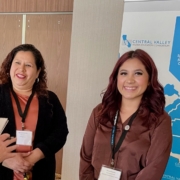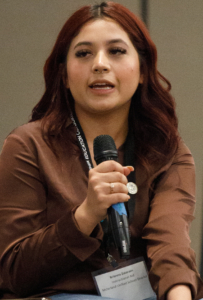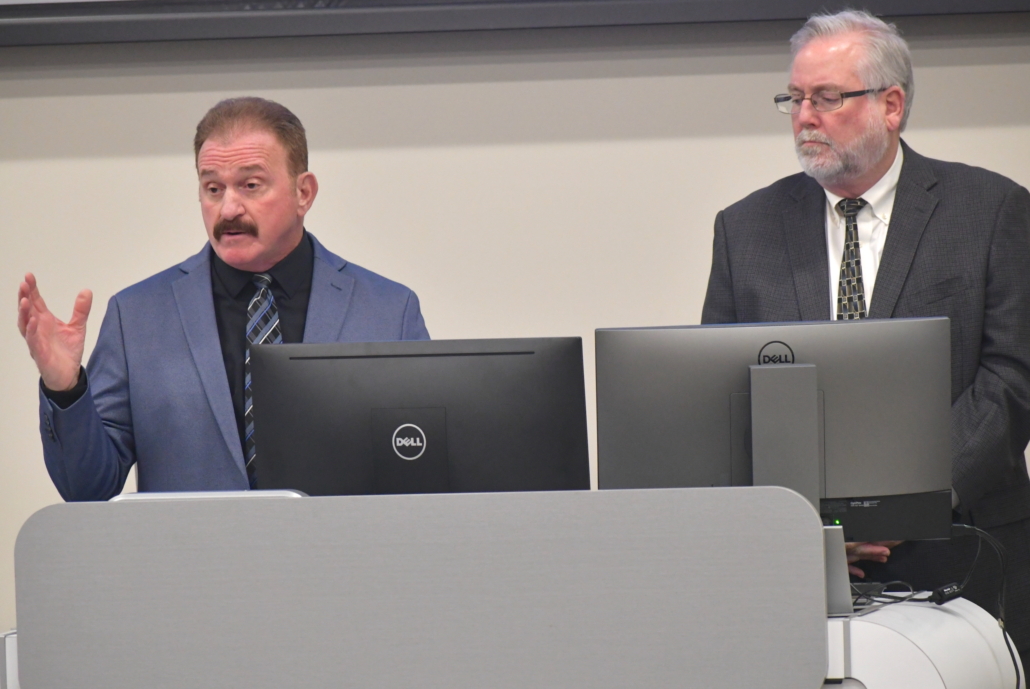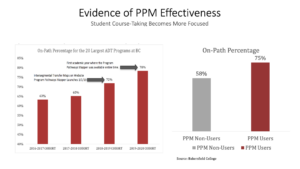Historic CVHEC Transfer Project/Program Mapper Featured at CSSO
CVHEC Executive Director Ben Duran took his The Central Valley Transfer Project team to the 2023 Chief Student Services Officers Association (CSSO) Annual Spring Conference for a presentation of the historic endeavor: Tom Burke, Stan Carrizosa and James Zimmerman.
Student Services Practitioners spring meet: ‘Liberation Now, Radical Actions for Today’
The historic Central Valley Higher Education Consortium Transfer Project and its Pathways Program Mapper that continues to break ground across the state for transfer reform was in the spotlight at another statewide convening with a presentation by CVHEC representatives during the 2023 Chief Student Services Officers Association (CSSO) Annual Spring Conference in Los Angeles.
During the CVHEC panel, “The Central Valley #TransferProject: The Breakthrough We’ve Been Waiting For!” March 15 at the Hyatt Regency LAX, California community college student services professionals learned about the consortium’s pilot project — launched last year by UC Merced, Merced College and Bakersfield College — that provides new strategies to increase transfers.
The session addressed how the Pathways Program Mapper, a public internet-based software application, presents students with pre-approved course sequences aligning the community college Associate Degree for Transfer (ADT) with the upper division requirements, by major, for successful degree completion.
Participants heard about the groundbreaking collaboration of faculty and administrators to build this model and how it has been refined and replicated for implementation by several more Central Valley community colleges, said Stan A. Carrizosa Sr., president-emeritus of College of the Sequoias who currently serves as CVHEC southern regional coordinator and Transfer Project lead.
He was joined by some of his Central Valley Transfer Project team made up of three colleagues with expertise in transfer issues: Dr. James Zimmerman, UC Merced associate vice provost; and Tom Burke, chancellor-emeritus of KCCD. (Burke also was recently appointed KCCD interim chancellor during the search for a new CEO after the appointment of Dr. Sonya Christian as chancellor of the California Community College System). Dr. Craig Hayward, Bakersfield College dean of Institutional Effectiveness also serves on the team.
Carrizosa said the reception to the team’s Transfer Project presentation at CSSO, similar to previous presentations at statewide convenings in the past year, was overall positive and he understands and respects the natural hesitancy to embrace new and innovative endeavors.
The project has been featured at several statewide conferences and workshops including the Lumina Foundation State Policy Retreat 2022, the Association of Chief Business Officials and the annual convention of the Community College League of California.
“We continue to have tremendous success as more colleges sign on every month,” Carrizosa said. “For some, though, the biggest challenge to overcome is the institutional inertia right now and resistance from colleges to add anything more to their to-do lists.
“However, we have found that once they get enough information to realize the simplicity of this project, they are really excited to get it done!”
Dr. Benjamín T. Durán Ed.D., executive director of Central Valley Higher Education Consortium and president-emeritus of Merced College also attended the CSSO conference and said that the viability and value of a movement like the CVHEC Transfer Project is underscored by recent reports of “a decline in transfers between community colleges and four-year institutions” – referencing the “Transfer and Progress” Report released March 9 by the National Student Clearinghouse Research Center.
“This report highlights the importance of the hard work being done by both the transfer teams at our member community colleges and our four-year institutions. Instituting tools like the Pathways Program Mapper simplifies the transfer process for students,” Duran said.
“The rest of the state is now looking at this endeavor as a way to increase the transfer rate.”
The team also discussed a recent survey compiled for the project’s two pilot colleges – consortium members Bakersfield College and Merced College – showing a direct correlation between students using the Program Mapper and important student success metrics, Carrizosa said.
“Our Transfer Project Team now convenes representatives from CVHEC, the UC and CSU creating an intersegmental collaborative group that is indeed the first of its kind,” he added. “In most districts where we are engaging in this work, we are also reaching out to include local K-12/high school districts with their effort as they support students’ transition to college.”
The CSSO Association is a non-profit organization committed to “Ensuring Opportunities for Success for Every Student” in California’s Community College system. The CSSO Association’s Executive Board is composed of dedicated student services professionals who utilize their professional expertise to foster a professional learning community for student service leaders within the core values of equity, social justice, leadership and community.
The 2023 CSSO Annual Spring Conference March 13-15 is the association’s premiere event designed to present student services practitioners with the unique opportunity to create innovative ideas and receive valuable professional development that will enhance the success of the 1.8 million students in the California community college system.
This year’s conference, the first in-person in two years, established new concepts with the theme “Liberation Now, Radical Actions for Today.”
Presenters shared evidence-based, action-oriented practices that relate to the conference theme as well as promote educational equity, social justice and liberatory actions within the Student Services framework for California Community Colleges.
“We welcomed the opportunity to share this historic mission for transfer reform,” Carrizosa said. “This was in line with one of the underlying principles of the conference call-for-proposals: to present current practices that disrupt inequitable outcomes for community college students.”
For media inquiries about CVHEC projects, contact Tom Uribes at tom@uribes.com or text 559.348.3278.
Related links:
- CSSO Conference Agenda
- ‘First of its Kind’ CVHEC Transfer Project Gaining Statewide Interest
- The CVHEC Central Valley Transfer Project
- Pilot CVHEC/UC Merced Transfer Project improves process for students
- Charting Better Maps to Degrees
- CVHEC BLOG: ‘WHAT THE CV-HEC IS HAPPENING’ (Dec. 2021)
- CV-HEC BLOG: UC Enrollment Push Supported by CVHEC/UC Merced Transfer Project and New Mapper Software
- CVHEC NEWS: Lumina Policy Retreat Presentation
ABOUT CVHEC
The Central Valley Higher Education Consortium is made up of 28 institutions of higher education in the Central Valley’s nine-county region from San Joaquin to Kern Counties (five four-year public universities, four independent universities, 11 community colleges in eight multi-campus community college districts). The presidents and chancellors of each member institution serve on the CVHEC Board of Directors which meets quarterly. The primary goal of the consortium is to increase the Central Valley’s certificate and degree attainment rates. CVHEC also serves as a regional convener on post-secondary equitable work that speaks in a single voice on higher education policy issues affecting our region such as but not limited to dual enrollment, transfer reform and open educational resources/zero textbook cost.

